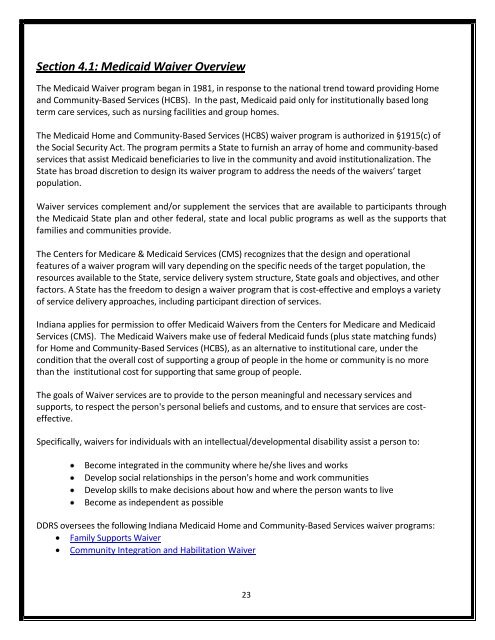DDRS Waiver Manual
2dXf5Pj
2dXf5Pj
Create successful ePaper yourself
Turn your PDF publications into a flip-book with our unique Google optimized e-Paper software.
Section 4.1: Medicaid <strong>Waiver</strong> Overview<br />
The Medicaid <strong>Waiver</strong> program began in 1981, in response to the national trend toward providing Home<br />
and Community-Based Services (HCBS). In the past, Medicaid paid only for institutionally based long<br />
term care services, such as nursing facilities and group homes.<br />
The Medicaid Home and Community-Based Services (HCBS) waiver program is authorized in §1915(c) of<br />
the Social Security Act. The program permits a State to furnish an array of home and community-based<br />
services that assist Medicaid beneficiaries to live in the community and avoid institutionalization. The<br />
State has broad discretion to design its waiver program to address the needs of the waivers’ target<br />
population.<br />
<strong>Waiver</strong> services complement and/or supplement the services that are available to participants through<br />
the Medicaid State plan and other federal, state and local public programs as well as the supports that<br />
families and communities provide.<br />
The Centers for Medicare & Medicaid Services (CMS) recognizes that the design and operational<br />
features of a waiver program will vary depending on the specific needs of the target population, the<br />
resources available to the State, service delivery system structure, State goals and objectives, and other<br />
factors. A State has the freedom to design a waiver program that is cost-effective and employs a variety<br />
of service delivery approaches, including participant direction of services.<br />
Indiana applies for permission to offer Medicaid <strong>Waiver</strong>s from the Centers for Medicare and Medicaid<br />
Services (CMS). The Medicaid <strong>Waiver</strong>s make use of federal Medicaid funds (plus state matching funds)<br />
for Home and Community-Based Services (HCBS), as an alternative to institutional care, under the<br />
condition that the overall cost of supporting a group of people in the home or community is no more<br />
than the institutional cost for supporting that same group of people.<br />
The goals of <strong>Waiver</strong> services are to provide to the person meaningful and necessary services and<br />
supports, to respect the person's personal beliefs and customs, and to ensure that services are costeffective.<br />
Specifically, waivers for individuals with an intellectual/developmental disability assist a person to:<br />
Become integrated in the community where he/she lives and works<br />
Develop social relationships in the person's home and work communities<br />
Develop skills to make decisions about how and where the person wants to live<br />
Become as independent as possible<br />
<strong>DDRS</strong> oversees the following Indiana Medicaid Home and Community-Based Services waiver programs:<br />
Family Supports <strong>Waiver</strong><br />
Community Integration and Habilitation <strong>Waiver</strong><br />
23


